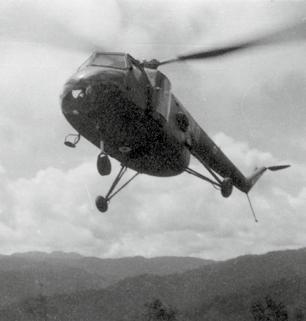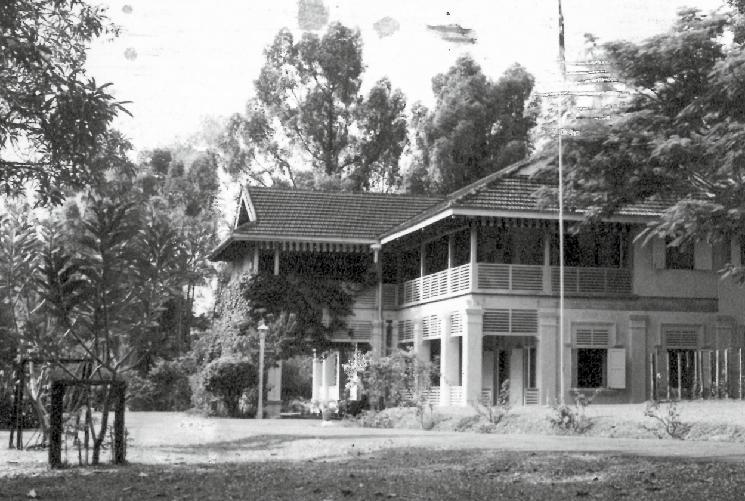
8 minute read
On Getting Our Royal Title and Other Memories
from 6 GR Journal 100
Flagstaff House, Seremban
The group photograph on the inside back cover of this Journal was taken at Wellington Barracks in 1959 on the occasion of the Regiment being granted the title of Queen Elizabeth’s Own and now contains only one living British 6 GR officer – me. I was only there thanks to the generosity of Major General Brigade of Gurkhas, Jim Robertson, whose ADC I was. Another invitation of great generosity arrived in my computer 60 years later from Duncan Briggs who invited me to attend the 6 GRRA reunion and AGM in November 2019 to help celebrate that unique occasion. So, after all that time of silence from me, I attended. I am so glad I did.
In 1959 the Malayan Emergency was still on, albeit the centrepiece of the defence of Malaya for six years and there were two years to go before peace was declared. In my time as ADC we lived in Flagstaff House, Seremban, where the architect of the victory, Field Marshal Gerald Templer was an occasional guest. What a fascinating guest he was and what a fascinating time I had.
We often flew in a Pioneer of the Army Air Corps piloted by Roger Hulton-Harrop (I think from the 14th/20th Hussars), an aircraft capable of landing and taking off on 100 yards of runway in theory. It took us to most of the British and Gurkha units still clearing the jungle of Communist Terrorists (CTs). We once visited wretched Gurkhas in a leper colony and shook victory was not far off. 17th Gurkha Division had been
hands without fingers.
Army Air Corps Pioneer
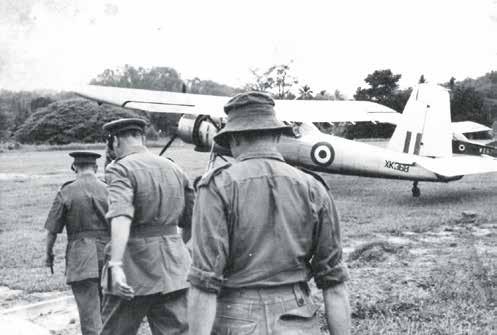
There was fun too. General Jim had a speed boat at Port Dickson- my introduction to water skiing. The London visit apart, the highlight of 18 months as ADC was a trek in Nepal preceded by a visit to Kathmandu, where we stayed in the British Embassy. Coincidentally, the American ambassador was to present his credentials the next day to which the General was invited. It was not done by halves. The new ambassador arrived on an elephant with a squadron of cavalry to escort him. The entire staff of the US embassy were presented to His Majesty in order of precedence, including the Naval Attaché who was last in line. Since the nearest ocean must be several hundred miles from Nepal it seemed fitting that he should bring up the rear.
Newly retired Gurkha Major Nainasing Thapa had invited us to his village Dhumpu, on the way to Annapurna II. The scenery was breathtaking, including the magnificent Machhapuchare ‘Fish Tail’ mountain. It took us about a week’s walk from Pokhara. Nainasing Sahib put on an amazing welcome complete with a band and nautch. We had been told that fishing for mahseer was on the cards. Fishing was sadly cancelled on the grounds that he had run out of dynamite.
1/6 GR was based in Ipoh in 1955 when I arrived as a very green young National Service officer fresh from an interview in London with Colonel Bruce of Everest fame. I suspect that I had been chosen due to a letter from my father to Field Marshal Bill Slim whom he knew from their days in the staff college in Quetta. Dad had been in the 18th Bengal Lancers, later to feature in the film ‘Bengal Lancer’.
Nothing had prepared me for the first Mess Night. My young orderly was almost as green. He had neatly laid out my mess kit on the bed. I discovered that either he, or more probably some brother officers, had my cuff links sewn into the collar where my wing collar should have been. My studs were neatly fixed into the cuffs. I was late for dinner.
Lt Colonel ‘Speedy’ Bredin DSO, MC on his first jungle patrol, Malaya
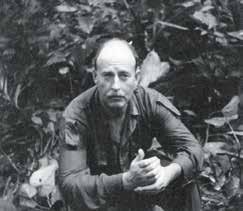
Colonel Walter Walker was CO at the time and he claimed with some justification that 1/6 GR was the best unit in the 17th Gurkha Division – we had more ‘kills’, we won the Nepal Cup more often, and had the best trained riflemen – Bisley proved it. He went on to greater things soon after my initiation as you will know. He was replaced by Lt Colonel ‘Speedy’ Bredin from the Dorsets. His formidable reputation was confirmed by a DSO and MC. He was reputed to have walked ashore in Normandy complete with dog and walking stick. What a privilege it was to see his son keeping the Bredin attachment to the regiment alive at the reunion. Colonel ‘Speedy’ soon wanted a taste of jungle warfare and I suspect felt that his newest and youngest officer needed blooding. I was put in command of his first jungle patrol. Not an easy task when neither of us had one word of Gurkhali.
As far as I was concerned that was put right by a posting to a rifle company on detachment in the Cameron Highlands. Bill James was in command complete with British gunners armed with 5.5” medium guns. We had a small fleet of Ferret scout cars for escort duties. That year gave me an introduction to active soldiering.
I witnessed two helicopter crashes. One with the new GOC, Major General ‘Totty’ Anderson, and his ADC, John Aslet 2 GR, on board and happily unhurt. Another
Major General Anderson and Lt Colonel Bredin
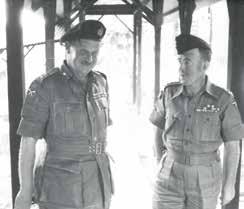
was on a deep jungle patrol where we had run out of food due to a DC3 airdrop failing to complete. On that patrol we bumped into a small group of British SAS troopers who failed to warn us of their presence. They were lucky. We ate tapioca (simul tarrul) found by the Gurkhas and originally planted by the CTs. With some difficulty we built an LZ on the side of a steep mountain. The first RAF ‘chopper’ was unable to hover in rarefied highland air and crashed into trees below us. It was a miracle that six Gurkhas with mortars and grenades on board and the pilot all managed to escape. The Fleet Air Arm chopper sent to extricate us did better.
The main tactical concern at that time was an ambush of the supply convoy on the very steep road from Tannarata in the plain up five or six miles of winding road to the Boh Tea estate where the rifle company was based. In the end I never let my piece off in anger on jungle patrol. I got close on escort duty in a Ferret scout car armed with a Browning sub machine gun. Our Gurkha driver did not drive slowly and negotiating one particularly sharp bend caused me to pull the trigger on the Browning. Happily, some 50 rounds ended up in the hillside and not in the village ahead of us. The Gurkha Quartermaster at detachment HQ was good enough to congratulate me on my target practice. Soon after I applied to join the Regiment as a regular and for some reason was accepted.
Then there was Hong Kong. The Regiment was based in Sek Kong in the New Territories. Separated from the city by steep hills navigated via the Snake Pass (Route Twisk) the bulk of the British military force was stationed in the New Territories. Our job was to prevent immigrant Chinese from crossing the border from mainland China. The Snake Pass was our link to the temptations of eligible expatriate girls from the UK living on Hong Kong island. I was lucky enough to have an older Naval cousin living on the Island at the time, all very handy. Inexplicably I was made MTO, the fact that I did not have a driving licence did not seem to matter. My driving test was reversing a Land Rover between a set of goal posts. Having learnt to drive a Ferret in Malaya was another possible reason. Essential access to Hong Kong depended on a battered MG which shed a rear wheel driving down the Snake Pass one weekend. I cannot remember which of my brother officers took it off me. Colonel Brunny Short was reaching the end of his command and I used the money from the MG to buy a large and very thirsty Oldsmobile from him.
Soldiering in the New Territories was mostly open warfare training and chasing wretched immigrant families across the paddy fields in the dark or arriving in rowing boats along the coast. The nearest we got The unsuccessful RAF Helicopter to excitement was a night driving exercise when a Gurkha drove a Ferret into a very large buffalo on the road. The Ferret was damaged, the buffalo walked away unhurt, the driver had a headache.
It was from Hong Kong that my second tour ended. I suppose the thought of non-stop training based in Kluang in a peaceful Malaya persuaded me that the end of active service was likely to lack excitement. How wrong I was. Within, I guess, 18 months the battalion was in Borneo sorting out the Indonesian invaders. It was too late. My resignation had gone through, confirmed by a charming letter from the Colonel of the Regiment, Field Marshal Lord Harding, which I still have. How moving it was to reconnect with the Regiment in Winchester on 26 November 2019.
Postscript.
This article was written by an 83-year old whose memory is fading. Please forgive any inaccuracies. A large number of photographs of my time with the Regiment were ruined by my trunk being dropped into Singapore harbour on its way home, which explains some of the sepia stains on the photographs.
Antony Wakeham
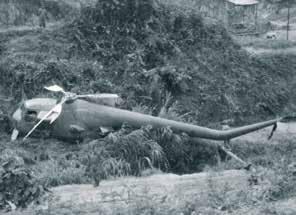
The more successful Senior Service Helicopter
